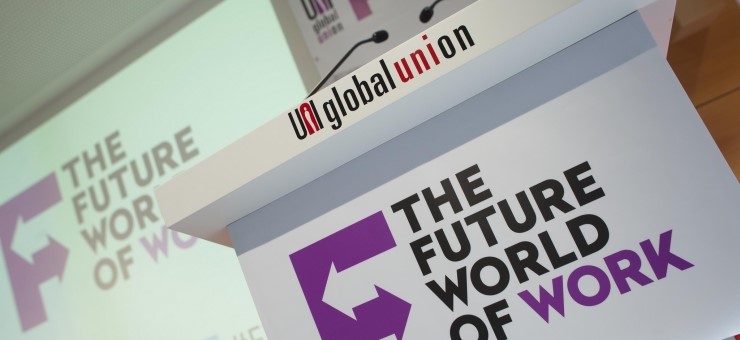WISERD researcher Dr Helen Blakely is working with UNI Global Union to identify trade unions’ responses to the changing world of work from around the world. This work is being presented at UNI Global Union’s World Congress in June 2018, the largest single global union gathering in the UK in 2018. Here they outline some of the case studies they have been examining and reflect on some of the challenges facing trade unions at present.
I am currently working with UNI Global Union to consider how trade unions are adapting to the rapidly changing world of work, an issue provoking debate at a global scale. UNI represents more than 20 million workers from over 900 trade unions in the fastest growing sectors in the world – skills and services. A total of 90% of new jobs are expected to be in these sectors in the next decade. UNI and their affiliates are driven by the responsibility to ensure these jobs are decent and workers’ rights are protected, including the right to join a union.
This is a qualitative project focusing on a number of case studies of trade union activity from around the world. The case studies cover a broad range of activity, but essentially all of the unions are grappling with the issue of establishing effective representation – whether this is in terms of building on past success, and growing an existing union in new ways, or building new unions to tackle contemporary challenges. The case studies reflect a spectrum of trade union responses, from forms of social movement and community based unionism, with no immediate ‘pay off’ in terms of securing collective bargaining coverage or membership fees for unions, to activity which has secured collective bargaining agreements and transformative increases in membership.
Some have developed new approaches within established organisations as in the case of Unite in the UK and its highly effective leverage campaigning, and cases in Germany (ver.di), the Netherlands (FNV) and France (CFDT, CGT, FO), which relate to union activity in direct response to the digitalization and automation of work. Those working in uncharted territory and creating new unions in response to the fragmentation of the global economy include SITT in Romania and SITRATEL in the Dominican Republic. There is also valuable work being done demonstrating unions’ capacity to benefit society beyond the workplace. Perhaps the most striking example of this is in the Democratic Republic of Congo, where the FNTPC has expanded its activity to help to develop the nation’s postal infrastructure.
The study shows the capacity of unions to respond to new challenges. We have found that in particular contexts it is possible for unions to mobilise and strengthen existing sources of power and harness new resources and capabilities to forge direct and indirect routes to sustainable gains for the labour movement.
Dr Steve Davies is working with Dr Blakely on this piece of research.

